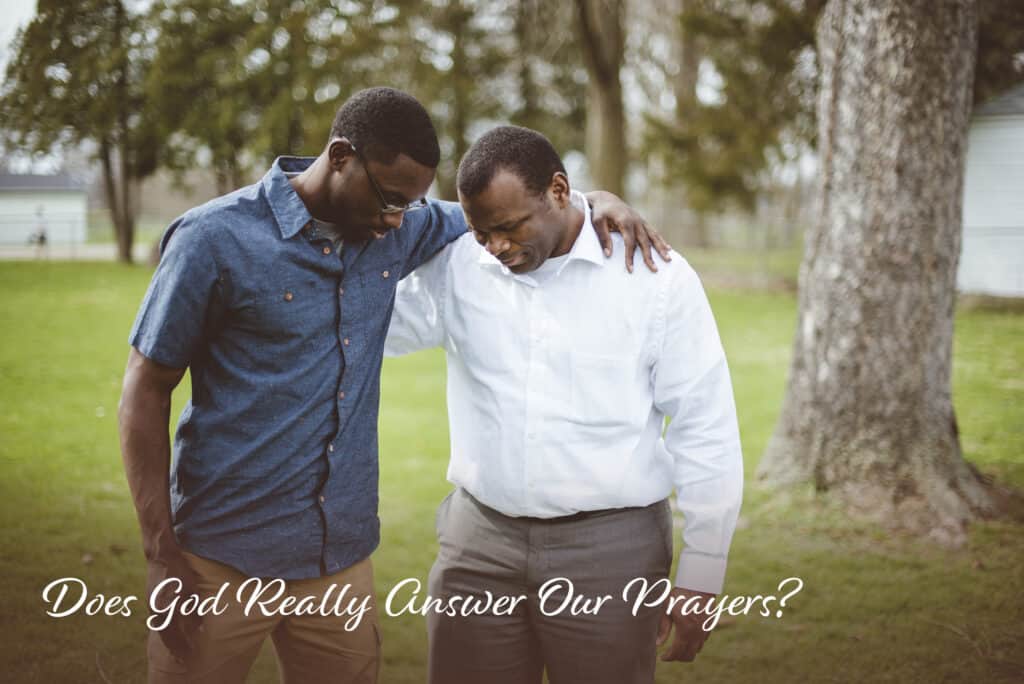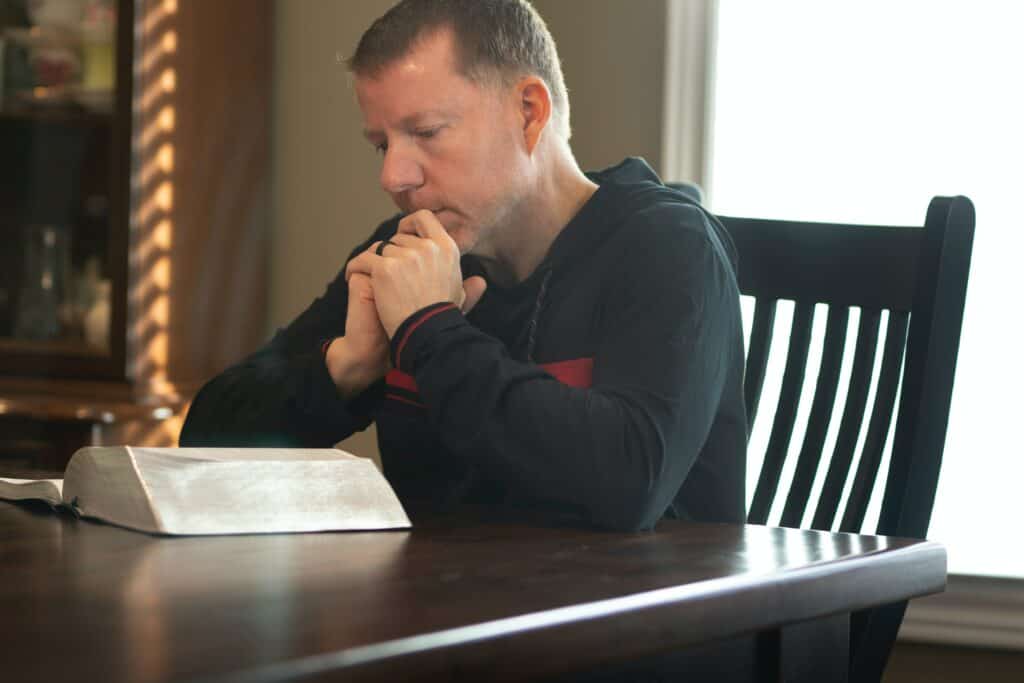
When we look through the Bible, we can read about a variety of ways God answers our prayers. It’s not always a basic yes-or-no answer—but that’s because most of life’s challenges just aren’t that simple, are they?
Scripture shows how God answers our prayers by going through our struggles with us. He always comes through, often revealing things we couldn’t even conceive of beforehand.
Studying these prayers throughout the Bible can help us strengthen our faith in profound ways. The same God who looked after His people in the Bible is also looking out for us today.
But how do we know if our prayers will be answered? And how do we understand God’s responses to our prayers?
While no one can fully know the mind of God, we can look at His Word. So let’s look at different ways God has communicated with humanity throughout the Bible. Here are the prayer scenarios we’ll cover:
- Prayer as a conversation with God
- When God answers “yes” to our prayers
- When God answers “wait” to our prayers
- When God answers “no” to our prayers
- Praying to God grows our faith
As we go through these biblical examples, the best thing to keep in mind is that no matter what we think, want, or do, God is the One who sees all, knows all, and loves all. While we may not always understand the way He answers our prayers, or the ways He communicates back with us, we can always trust that He has our ultimate well-being in mind.
Having a Conversation with God
The first thing to understand about prayer is that it’s a two-way conversation with God—even if words aren’t always used.
Prayer is a way of maintaining a relationship with our Lord—not simply a means of asking for this or that. So when we talk of “answers” to prayers, it’s certainly not always a yes/no/maybe/later type of situation. Just like communication in any relationship, you can’t always categorize every type of response.
But we can have faith that God wants what’s best for us (Jeremiah 29:11). And when we stay close to God, keeping in contact with Him and following His laws, we can trust that He knows each of our needs and will look after us.
This point is emphasized in the story of Abraham. He had a deep relationship with God, talking with Him and becoming familiar with His voice.
Abraham was deeply troubled about his family, for he and his wife weren’t able to have children. Abraham was afraid that his family and legacy would die with him, and he brought these fears to God:
…O Lord God, what will you give me, for I continue childless, and the heir of my house is Eliezer of Damascus?’
Genesis 15:2-5 (ESV)
And Abram said, ‘Behold, you have given me no offspring, and a member of my household will be my heir.’
And behold, the word of the Lord came to him: ‘This man shall not be your heir; your very own son shall be your heir.’
And he brought him outside and said, ‘Look toward heaven, and number the stars, if you are able to number them.’ Then he said to him, ‘So shall your offspring be.‘

Abraham had an honest and open relationship with God, and he wasn’t afraid to bring his fears and doubts before Him.
This illustrates the sort of openness with God we can strive for. We’re encouraged to bring all our problems to Him, trusting that He’ll work everything out.
And we may not always see the answer to our prayers.
Abraham never saw his offspring become as innumerable as the stars. But God kept His promise in His own time, and He still keeps promises and answers prayers today.
But there are plenty of prayers we might see answered, like when Abraham’s wife Sarah became pregnant with their first son, Isaac (Genesis 17:16).
All in all, the evidence of the Bible shows us that God is always listening, and always ready to take care of our needs if we trust Him.
When God says “yes” to prayers
As we saw in the story of Abraham, God has a way of answering our prayers in a big way, providing for us better than we could ever have thought to ask for in the first place.
Like a loving father, God delights in taking care of us, blessing us beyond our biggest dreams.
There are countless examples in the Bible where God said “yes” to people’s prayers.
- David’s prayer to rescue his family (1 Samuel 30:1-19)
- Gideon’s request for a sign of God’s faithfulness (Judges 6:36-40)
- Elijah raising the widow’s son back to life (1 Kings 17:17-24)
- The Church prays that Peter be released from prison (Acts 12:1-17)
- Paul heals the chief’s father on Malta (Acts 28:7-10)
Looking at these examples, we see how God is more than willing and more than powerful enough to fulfill whatever we ask of Him, when we pray with even a small amount of faith (Matthew 17:20).
This point of prayer and faith is illustrated in the story of Hannah, found in 1 Samuel 1. She was childless and even suffered ridicule because of it.
Every year she would go up to the temple with her husband and pray for a child, weeping and pouring out her sorrows to God. She vowed that if God sent her a son, she would dedicate her child to Him.
God answered her prayer in a big way. Hannah’s son was Samuel, who grew up to be one of the greatest prophets in all the Bible. He guided his people back to God and anointed the first two rulers of Israel, King Saul and King David.
This story shows us how perfect God is at answering our prayers, but it also shows us a good way to respond when our prayers are answered. When Hannah finally had her child she gave all the glory to God, acknowledging that it was He who had given her this tremendous gift (1 Samuel 2:1-11).
In the same way, it’s important for us to remember God’s goodness and acknowledge Him when He answers our prayers. It’s only fitting to give thanks when we remember how much He’s done for us.
Have you ever wondered if there’s a “secret” to a more powerful prayer life? Learn more about how prayer works, and how to enrich your walk with God.
When God answers “wait” to our prayers

Sometimes the things we pray for don’t happen right away. Sometimes the answer God gives us is a small, quiet, “wait.”
We don’t know the future like God does. His timing is perfect because He sees everything happening, and He knows every possibility.
There are verses all over Scripture that instruct us to “wait upon the Lord,” trusting in His impeccable timing.
But they who wait for the Lord shall renew their strength; they shall mount up with wings like eagles; they shall run and not be weary; they shall walk and not faint.
Isaiah 40:31 (ESV)
I waited patiently for the Lord; he inclined to me and heard my cry.
Psalms 40:1 (ESV)
Be still before the Lord and wait patiently for him…
Psalm 37:7 (ESV)
Abraham and Sarah had to wait a very long time before they had a child (Genesis 15:2-5).
The children of Israel had to wait 400 years to be delivered from Egypt and given a new home (Exodus 2:23-25).
But God, seeing the end from the beginning, knew when things would best work out.
Waiting on the Lord means trusting in His ultimate wisdom.
Our first reaction to hearing “wait” is not always positive. Sometimes it can feel frustrating or disappointing, especially if we’ve already been waiting for something to happen.
We often want a definite “yes” or “no.” That way, we at least know where we are with things. But sometimes, the thing we need most is to trust God.
Has a child ever asked you a question, and you had to say, “just wait and see…it won’t really make sense if I explain it now.”
Or maybe you’ve heard that same thing from a parent or teacher when you were growing up!
It’d be silly to say that’s the answer the child is looking for. But sometimes, due to the complexity of a situation, or if you know that something’s about to happen that will help things fall into place, that’s the best answer to give at that time.
And we live in a world where good and bad are all mixed up together. There’s a great controversy going on, and sometimes the things we ask for aren’t as simple as we realize.
Sometimes, in respect for the free will of others, in circumstances we are unable to see or even think of, it takes time for God’s answer to play out. But we can trust that while we wait, God is right there beside us.
We’re talking about the Creator of the universe, after all. His view of events is far wider and deeper than ours. And His plans always work out.
When God says “no” to prayers
We talked about trusting God in our prayers and how His plans always work out. But what happens when God’s plan differs from ours? What do we do when God’s answer to our prayers is “no”?
Let’s look at some examples in the Bible.
Moses’ Prayer
We get a little insight in Deuteronomy 3 with Moses and the children of Israel. Moses lost his temper and neglected to follow God’s instructions while guiding the Israelites through the wilderness (Numbers 20:1-13). And because of that, he wasn’t allowed to enter the Promised Land.
Moses prayed again and again, pleading with God to let him enter the land he’d traveled so far to reach. But God remained firm in His decision. Moses would not enter the Promised Land. However, God did allow Moses to see this land. Before he died, Moses was sent up Mount Pisgah and got a good, long look at the fertile land his people would soon call home (Deuteronomy 3:23-28).
David’s Prayer
In 2 Samuel 7, King David wants to build a temple to God. He doesn’t think it’s right for him to have a huge palace while God’s place of worship is a simple tent. So he sought the counsel of the prophet Nathan, who said to go ahead with his plans for the temple.
But that night, God sent a message to Nathan. He instructed him to tell David that he was actually not the one who would build God’s temple. David had good intentions and wanted to honor God, but God had a greater plan in mind.
Even though David would not be the one to build the temple, God promised that David’s family line would prosper and that one of his children would build the temple.
God kept His promise, and David’s son Solomon eventually constructed a marvelous temple in Jerusalem, one of the most splendid places described in all the Bible (1 Kings 5-8).
This story of King David gives us the assurance that, even if God doesn’t give us the things we pray for, it doesn’t mean He doesn’t have something wonderful in store. He is always watching over us, looking out for our best interests, and working for our good.
David never got to see the marvelous temple that would eventually be built, but his wish to have a beautiful place dedicated to God was granted.
In the same way, we can trust that when God says “no” to things we pray for, it often means He has something better coming along. And it could be something more beautiful and wonderful than we could have ever planned for ourselves.
Jesus’ Prayer
God answering “no” is not a sign of His rejection. God even said “no” to His own son.
When Jesus was in the garden of Gethsemane the day before his crucifixion, He prayed desperately to His Father. He was feeling afraid of the immeasurable suffering He was about to go through. So He pleaded with God:
…My Father, if it be possible, let this cup pass from me; nevertheless, not as I will, but as you will.
Matthew 26:39 (ESV)
“Not as I will, but as you will.” That’s the attitude of faith.
When our prayers are answered with what looks like a “no…”
When it seems our deepest desires are denied or put aside…
When the thing we’ve asked for again and again still hasn’t happened…
This is what we can still do. We’re asked to trust.
Jesus trusted his Father God. Even when he didn’t like the plan or was afraid of how things might turn out, He trusted his Heavenly Father and followed His will, and was willing to make the sacrifice that made eternal life available to all of us.
Having God answer “no” to a prayer may be one of the hardest things we’ll experience. But even when the answer is “no,” God acknowledges our trust in His perfect plans and His perfect timing.
Bringing our cares to God in prayer, with faith

The Bible gives us hundreds of examples of what our prayers can look like, how we can approach God with our problems, and how He’s always willing to come through.
Sometimes He gives us tremendous blessings, or He answers our prayers before we even ask. Sometimes He asks us to wait and rely on Him, and other times He tells us no, assuring us that He has something far greater in store.
We can’t guess at God’s will for our lives or try and predict how He’ll answer our prayers. But there’s one thing we can rely on, and that’s God’s love for us. We are His children, hand-crafted by Him, and what perfect Father doesn’t love looking after his family?
What father among you, if his son asks for a fish, will instead of a fish give him a serpent; or if he asks for an egg, will give him a scorpion? If you then, who are evil, know how to give good gifts to your children, how much more will the heavenly Father give the Holy Spirit to those who ask him!
Luke 11:11-13 (ESV)
When we bring our deepest thoughts, concerns, and struggles to God in prayer, we can come before Him like a child asking for help, trusting that our heavenly Father will provide.
Because He will! The Bible is full of evidence of His love and power, and God is just as loving and powerful now as the day He made this world.
No matter the “answer” to our prayers, the Bible assures us that God cares for us and He will never leave us.
Want to learn more about the God we pray to? There’s always more to discover. Start your own personal Bible study today.